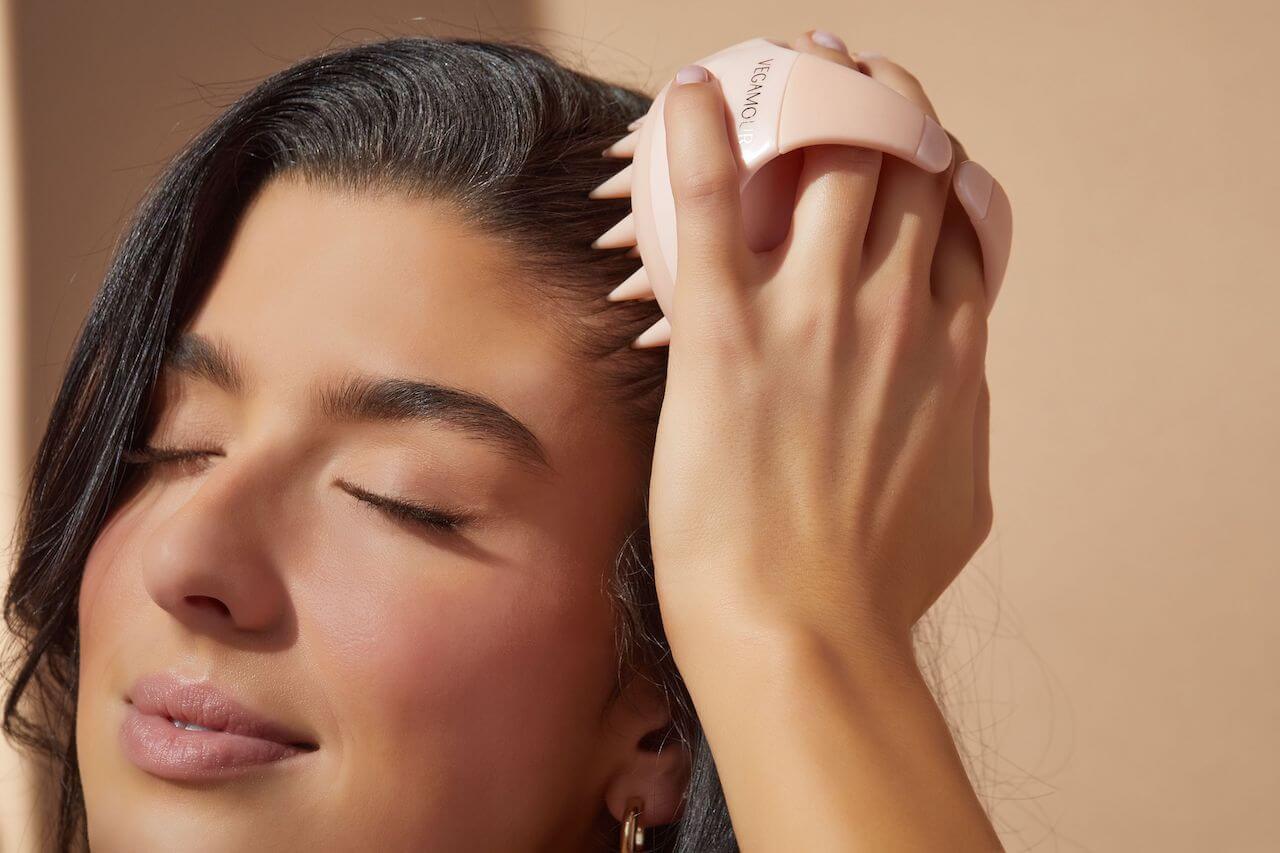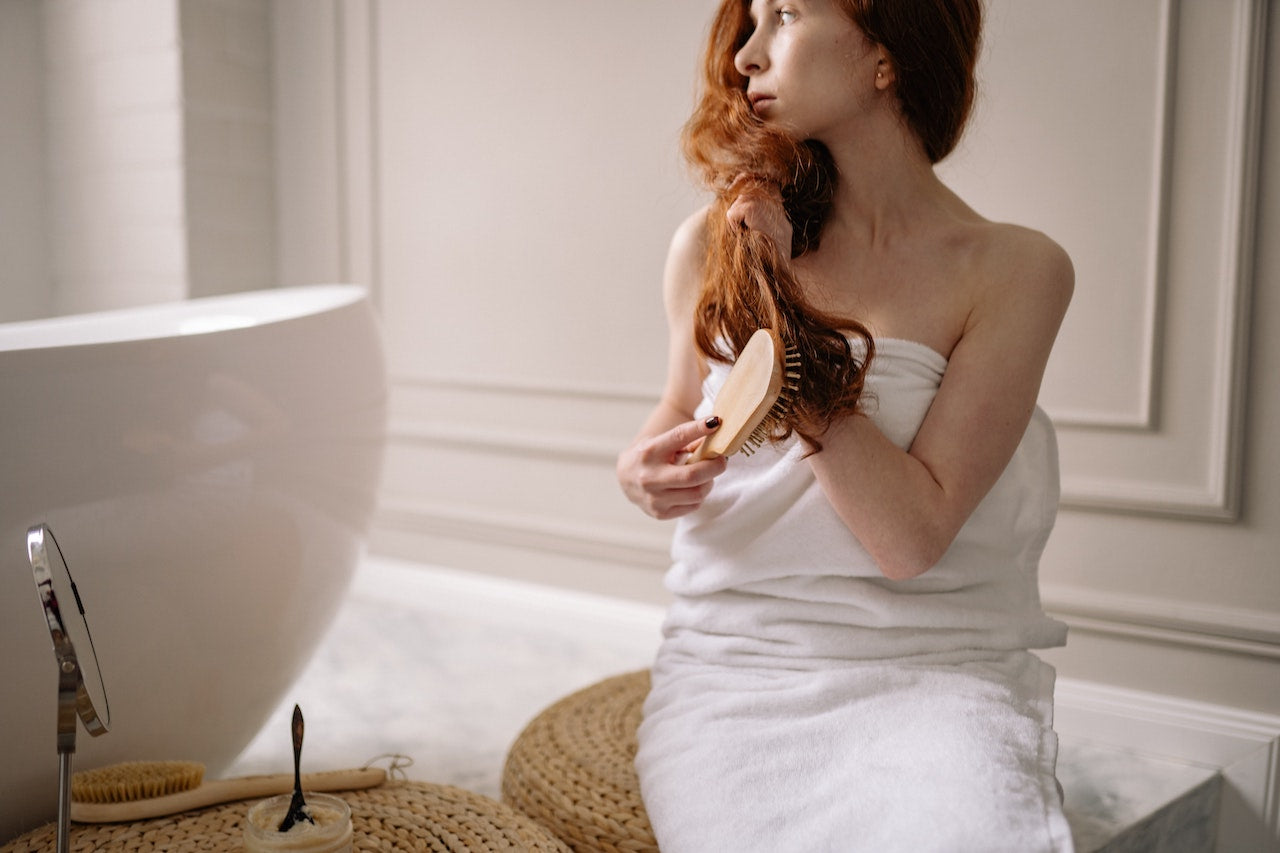For those who stick to a natural hair care routine, pure jojoba oil can be the ultimate secret beauty weapon. Like other natural oils including coconut, olive and marula oil, jojoba seed oil has become a popular restorative treatment used to help hair recover from harsh hair products and nourish dry strands.
To help understand all the benefits of this potent antioxidant, VEGAMOUR asked the experts to explain what jojoba oil can do for your hair follicles. Plus, discover the best pure you need to keep your hair, skin and nails shiny and healthy.
What is Jojoba Oil?
Although it's called an oil, jojoba is actually a wax ester sourced from the jojoba shrub, which stores a wax-like substance in its seeds. Often used as a carrier oil for essential oils, jojoba oil is also a popular treatment used to combat brittle hair, dry skin and dandruff.
On a chemical level, jojoba oil is the closest thing the plant world produces to the natural sebum produced by your skin and scalp. This means that your body is able to easily absorb it, taking in the potent blend of fatty acids, vitamin E and anti-inflammatory and antioxidant properties of the wax. Jojoba also naturally has a pH balance that makes it suited to adapt to your skin's natural environment.
"Jojoba oil is non-comedogenic, meaning it won't clog pores," said health blogger Andrew Livesay. "It's also hypoallergenic and non-irritating, making it a good choice for people with sensitive skin. Jojoba oil is an emollient, which means it helps to soften and lubricate the skin. In addition, it's a natural antioxidant that can help to protect the skin from environmental damage."
Jojoba oil is a natural ingredient that works tremendously well at moisturizing dry skin and hair follicles, making it an easy indulgence to feel good about. "Jojoba oil is plant-based and vegan-friendly," Livesay said. "It's a good choice for people who are looking for an alternative to animal-based products. It's also relatively inexpensive compared to other oils, making it a good choice for people on a budget."
While there are many natural oils to choose from, jojoba has a few particular advantages. If you're looking for a carrier oil to blend with other essential oils, jojoba oil is a great base. But thanks to its shelf stability and host of benefits — including its high vitamin content, easy absorbability and ability to create a protective layer — jojoba oil truly stands out as one of the best plant-based oils you can use in your beauty routine.
Read More: Can Olive Oil Impact Hair Growth?
The Benefits of Jojoba Oil
According to dermatologist Dr. Cory Gaskins, there are many benefits to using jojoba oil. “Jojoba oil has been known to be a great hair moisturizer because it can help to protect against breakage and dryness," he said. "This oil is also said to be beneficial for people who have oily scalp conditions."
It might seem counterintuitive to apply jojoba oil to your scalp if you're producing excess sebum already, but doing so can actually normalize oil production, helping your sebaceous glands get back on track and boosting overall scalp health.
Jojoba is great for dry scalps as well; its anti-inflammatory properties can help soothe an itchy scalp. The all-natural oil helps form a protective seal that can be used to treat and prevent seborrheic dermatitis. "Jojoba oil can help to control dandruff," Dr. Gaskins said. "It does this by balancing the oil or sebum production on the scalp. If you have a problem with dandruff, you should try using jojoba oil as a natural remedy."
Even if you're not struggling with an oily scalp or pesky flakes, you can still enjoy the benefits of jojoba oil. When used on damp or towel-dried hair, jojoba oil can help smooth frizzy hair and provides some much-needed nourishment to your hair shafts. "This oil can also help to improve the strength and elasticity of your hair," Dr. Gaskins said. "This is due to the fact that jojoba oil contains vitamin E, which is known to be beneficial for hair health.”
Shop: Destiny Thompson's Top VEGAMOUR Picks
What You Should Know Before Using Jojoba Oil
Because it's a lighter-weight oil, jojoba oil is generally considered suitable for all hair types. People with fine or thin strands who find other oils too greasy might even discover that jojoba is the only natural oil they can use to soothe their dry strands without weighing them down. It's also particularly good for curly hair, which tends to need a lot of moisture and is prone to frizz. Jojoba's sebum-mimicking qualities make it the perfect choice for nearly every hair type, texture and length.
However, Dr. Gaskin warned that jojoba oil's versatility shouldn't make you consider it a cure-all. “Jojoba oil should not be taken by mouth as it can be unsafe," he said. "The oil contains erucic acid, which can be toxic if consumed in large quantities.”
While jojoba oil is an all-natural ingredient, that doesn't mean it's safe to take orally. However, for most people, using jojoba oil on your hair, skin or anywhere external is perfectly safe, although Livesay said you shouldn't go crazy.
"Although it's non-comedogenic, it can still clog pores if used in excess," he said. To avoid this, make sure to ease into your new jojoba oil routine, starting with a small amount and working your way up to see what your skin and strands can handle.
And just like any other new product you might add to your hair or skin routine, doing a patch test to monitor for allergic reactions before committing to use is always a good idea. Simply apply your oil on a small patch of skin where it won't get rubbed off and wait to see if you have an allergic reaction. If not, go ahead and add it to your routine.
Read More: Is Hair Slugging the Next Big Trend? TikTok Users Think So
How to Use Jojoba Oil on Your Skin, Hair and Scalp
According to Dr. Gaskins, you have many options when it comes to making jojoba oil a part of your daily beauty regimen. For starters, jojoba oil is great for boosting both your body and face moisturizers.
“Jojoba oil can be added to your favorite moisturizer to help lock in hydration and keep your skin looking plump and healthy," said Dr. Gaskin. Simply apply to freshly cleansed skin, following up with a secondary moisturizer, or enjoy it as is for a little light, glowy hydration.
Jojoba oil can easily be worked into your end-of-day skincare routine. "As a makeup remover, jojoba oil is incredibly effective," Livesay said. "It can remove even waterproof makeup with ease! Simply apply the oil to a cotton ball and gently wipe away your makeup."
And then, of course, there's haircare. "Jojoba oil can be used before washing your hair as a pre-shampoo treatment," said Dr. Gaskins. "By massaging the oil into your scalp and down the lengths of your hair, you can help break up any built-up products or oils that might be weighing down your strands.”
Many people use jojoba oil as an addition to their favorite overnight hair mask, slathering it on before applying a protective hairstyle, allowing the hair to soak up all the moisturizing benefits of jojoba oil while you sleep.
If you're interested in using jojoba oil as part of your wash day habits, starting with a scalp detoxifying scrub is the best way to begin. Spend some time really getting in there, massaging your damp hair with fingers or a scalp massager designed to get the job done. This is an especially critical step if you have thick hair, which tends to suffer the most from clogged follicles, as the weight of your long strands tends to pull hair down. Once all the gunk and grime is out of the way, apply jojoba oil to the lengths of your hair before styling as desired.
A Natural Approach to Hair Wellness
With its versatility, affordability and wide array of benefits, adding jojoba oil to your beauty routine seems like a no-brainer. One of the best things you can do to support the wellness of your hair is to use non-toxic and natural products in your hair care routine. Adding jojoba oil or products with all-natural ingredients that are clinically proven to work can help keep your hair and scalp healthy for years to come.
#include-related-slider#
More From VEGAMOUR
- Shop: Clean Hair Care Products
- Read This Before Getting PRP for Hair Loss
- 9 Biotin-Rich Foods for Healthy Hair
- 10 Things to Avoid When Growing Your Hair
Photo credit: Pixabay/Pexels




















